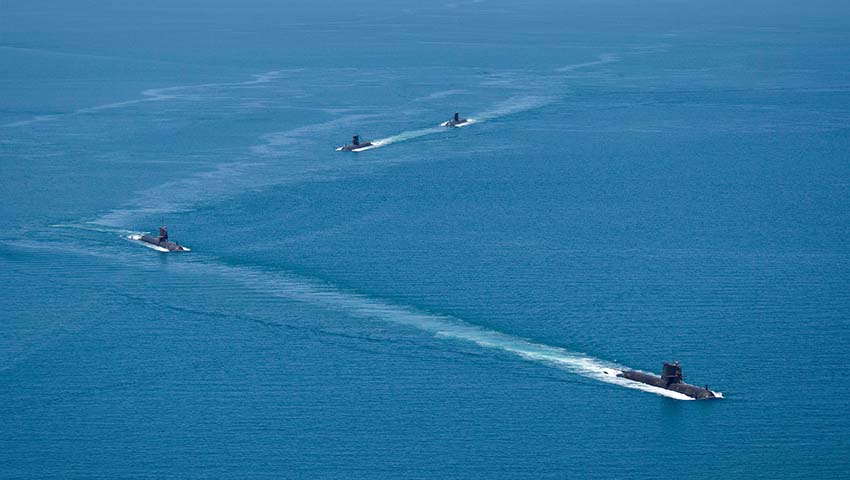Could Australia’s nuclear submarine deal with the United States and the United Kingdom scupper efforts to bolster the nation’s sovereign defence capabilities?
To continue reading the rest of this article, please log in.
Create free account to get unlimited news articles and more!
The newly established AUKUS alliance — which will see nuclear-powered submarines built in Australia as part of knowledge-sharing arrangement — has largely been welcomed by the political class and stakeholders across Defence and defence industry.
Supporters have touted the capability benefits of a nuclear-powered submarine fleet, as well as the long-term advantages associated with accessing cutting-edge technology developed overseas.
However, critics have flagged potential risks to Australia’s sovereignty, claiming AUKUS could undermine the broader push to reduce dependence on foreign militaries, particularly in response to localised regional disputes.
But according to Stephan Frühling, a professor in the Strategic and Defence Studies Centre of the Australian National University, critics of the AUKUS arrangement are conflating self-reliance with self-sufficiency.
He notes that the focus on self-reliance arose from repeated confrontations between Australia and Indonesia over West Papua and East Timor, which were not of geostrategic concern for the US.
As such, self-reliance, Frühling adds, reflected Australia’s desire not to rely on US combat forces in regional crises but did not exclude dependence on foreign resources, including intelligence, technology and resupply.
“Self-reliance was never self-sufficiency; it was ‘self-reliance in alliance’,” he continues.
“The decision to acquire nuclear submarines, which will no doubt require far greater reliance on ongoing US (and UK) assistance in the maintenance of Australia’s submarine fleet, is therefore consistent with [self-reliance].”
Frühling also addresses concerns that dependence on foreign resources could limit Australia’s “freedom of action” amid fears the AUKUS deal would draw the country into a conflict with China.
“[The] argument here must be with this underlying judgement, rather than with the decision itself – for history shows how difficult Washington has found it to cajole allies into joint action if they didn’t see it as in their own interest, regardless of how closely they were integrated with, and depended on, the US,” he adds.
“Washington’s exasperation about the European abstinence from the war in Vietnam, NATO allies’ refusal to open their airspace for US strikes on Libya in 1986, German and French active opposition to the invasion of Iraq in 2003, and indeed Australia’s refusal to participate in the Libya intervention in 2011 are prominent examples.”
Frühling argues that Australia’s acquisition of nuclear submarines with US assistance would “likely stand out as a far more congenial arrangement”.
The ANU professor goes on to call for a “dose of realism” with regards to industrial sovereignty.
“Britain couldn’t maintain its nuclear weapons without the US for more than a few months,” he writes.
“While France has a genuinely sovereign nuclear arsenal, it never strove for a self-sufficient conventional defence even during the Cold War and remains highly dependent on direct US logistics and intelligence support for its operations in the Sahel.
“And despite Israel’s development of a sophisticated arms industry, its dependence on the US remains real, and one that Jerusalem realises must ultimately be managed politically, not technologically.”
According to Frühling, material dependence on the US is “a fact of life” for countries with greater resources than Australia, adding it’s “entirely consistent with self-reliance” as long as the US is willing to offer support in relevant circumstances.
He concedes that the practical implications of this principle would need reinterpretation as strategic circumstances change.
“In the 1970s and 1980s, we could assume that the US could comfortably meet our limited demands on advanced munitions and other consumables from its vast Cold War stockpiles,” he writes.
“But now, as the 2020 defence strategic update rightly recognised, our needs would compete with — and thus likely miss out to — those of the US itself.
“In wartime, it would probably be harder for us to get access to US missiles and torpedoes to shoot from our submarines than to find US reactor technicians to service them.”
Frühling concludes: “In that sense, as much as the momentous decision to acquire nuclear submarines is a sign of confidence in the alliance, increases the potency of our submarine fleet and remains consistent with self-reliance, by itself it does little to make the alliance and our defence co-operation as such fit for the practical demands of great-power competition and war in the Indo-Pacific."
Get involved with the discussion and let us know your thoughts on Australia’s future role and position in the Indo-Pacific region and what you would like to see from Australia's political leaders in terms of partisan and bipartisan agenda setting in the comments section below, or get in touch with
Charbel Kadib
News Editor – Defence and Security, Momentum Media
Prior to joining the defence and aerospace team in 2020, Charbel was news editor of The Adviser and Mortgage Business, where he covered developments in the banking and financial services sector for three years. Charbel has a keen interest in geopolitics and international relations, graduating from the University of Notre Dame with a double major in politics and journalism. Charbel has also completed internships with The Australian Department of Communications and the Arts and public relations agency Fifty Acres.

 Login
Login








